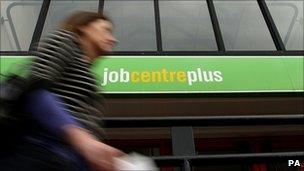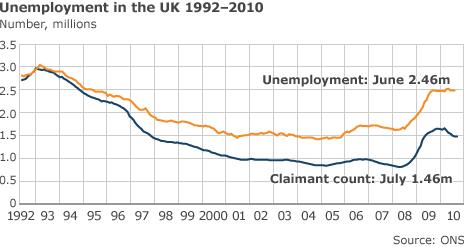UK unemployment falls to 2.46 million
- Published

Analysts were worried about the small drop in the claimant count figure
The number of people unemployed in the UK fell by 49,000 to 2.46 million in the three months to June, figures show.
The decline in the jobless total was the biggest drop in three years.
The number of people employed increased by 184,000, the largest quarterly rise since 1989, the Office for National Statistics (ONS) said.
The figures also showed that the claimant count, or those out of work and seeking unemployment benefit, fell by 3,800 in July to 1.46 million.
The rise in the number of those employed was largely the result of an increase in the number of part-time workers of 115,000, taking the total to 7.84 million, the highest figure since comparable records began in 1992, the ONS said.
The number of full-time workers increased by 68,000 on the quarter to reach 21.18 million.
The overall UK unemployment rate for the three months to the end of June compared with the previous three months fell by 0.2% to 7.8%.
Within the UK, the jobless rate in Wales fell by 0.3% to 9%, in England it dropped by 0.2% to 7.7% and in Northern Ireland it also fell by 0.2% to 6.6%.
However, in Scotland, the rate increased by 0.2% to 8.4%.
The ONS also said that average pay was up by 1.3% on a year earlier, a slower annual rate of growth than in the previous three months.

Growth worries
But despite the big drop in the jobless number, analysts focused on the small change in the number of people seeking unemployment benefits, saying this was further evidence that the economic recovery was starting to lose momentum.
"This looks like yet another set of strong and encouraging figures on the surface," said Gerwyn Davies at the Chartered Institute of Personnel and Development.
"However, cracks now seem to be emerging; with a considerable growth in part-time work, lower pay settlements and a slower decline in the claimant count all features of a more uncertain jobs market.
Some even suggested that the jobless number could rise in the coming months.
"This might be a sign that the slowdown in the wider economic recovery is already spreading to the labour market. And with sharp public sector job cuts looming, we still think that renewed rises in unemployment lie ahead," said Vicky Redwood at Capital Economics.
Concerns about the strength of the recovery were reflected in the Bank of England's latest economic forecast, also published on Wednesday.
The Bank downgraded its estimate for growth next year to less than 3%, down from about 3.5%, and said that inflation would stay higher for longer than previously forecast.
Nervous shoppers
GSPK Design in Knaresborough is one company taking on new staff
Figures released earlier this week also fuelled concerns about the strength of the recovery.
On Tuesday, research from the Royal Institution of Chartered Surveyors (Rics) suggested that house prices were starting to fall.
Rics said that although most surveyors had seen no change in prices in the past three months, those seeing a fall had outnumbered those reporting a rise for the first time since July last year.
Separate data also indicated that growth in UK retail sales had slowed sharply in July.
The British Retail Consortium said like-for-like sales, which strip out the impact of sales from new stores, had risen by 0.5% in the month compared with a 1.2% rise in June.
It argued that consumers were becoming nervous about the impact of government spending cuts designed to cut the UK's budget deficit.